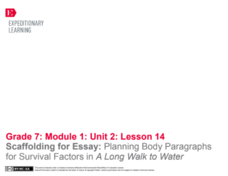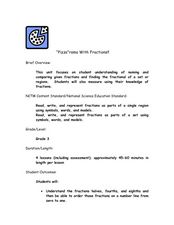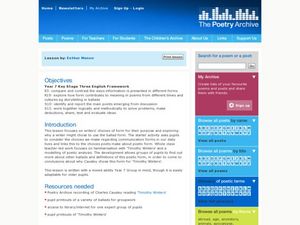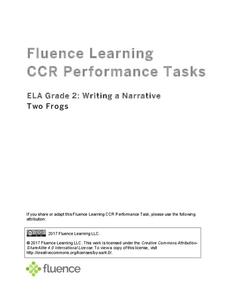Curated OER
Locate Key Information in Nonfiction Text
Interpret nonfiction text with your class. Readers use key information found in nonfiction text to answer questions and problem solve. They utilize the chapter headings, diagrams, glossary, maps, and captions as well as the table of...
EngageNY
Scaffolding for Essay: Planning Body Paragraphs for Survival Factors in A Long Walk to Water
Some things are complicated. Scholars continue to look at the model essay and rubric related to A Long Walk to Water. This time, they focus only on row three of the rubric because it is a more complicated portion. Writers think about the...
Curated OER
Muscular and Skeletal Systems
How do muscles move bones? Find out using a built-in-class model. Pupils construct a hand model with paper and string, then follow a series of directions to explore the movement process. Discover additional information about the muscular...
Tracy Pendry
Cardiovascular/Circulatory System
Explore the circulatory system with a cardiovascular pump activity that promotes discovery and discussion as class members create a functioning model of the heart. Continue the learning process through a web quest showcasing the...
PBS
Before We Travel, We Research
Context is key when it comes to historical research. Prior to field research, class members learn as much as they can about the site they are going to visit. Groups investigate and prepare presentations about the history of the site, the...
Curated OER
Use Details from Text to Identify Cause and Effect, Draw Conclusions, Compare and Contrast
Third graders discuss research topics and write a paragraph on one of the provided questions. They focus on including key words from charts that the class has been compiling. They underline supporting details within the text they write....
Curated OER
What to Do with Leftovers
Second graders solve real world division story problems using unifix cubes. They read "A Remainder of One" and discuss the concept of remainders. They solve the division problems first with the cubes and then write the problem and answer...
K12 Reader
Simplifying Fractions
Young mathematicians respond to a series of comprehension questions after reading an article about simplifying fractions.
K12 Reader
Converting Fractions to Decimals
After examining a short article on fractions and decimals, readers draw information for the text to respond to a series of reading comprehension questions.
K12 Reader
Oxygen Exchange
An article about the vascular tissues inside plants provides an opportunity to assess reading comprehension. After reading the passage, kids respond to a series of comprehension questions.
Math Mammoth
Recognize Fractions
In this fractions activity, students use the shaded figures and write fractions based on the shaded area to the whole area. Students also learn how to draw pie models. Students divide the circle into fractions and color the right amount...
Curated OER
"Pizza"rama With Fractions!!
Young mathematicians explore number values by utilizing food as a visual aide. They discuss the differences between halves, fourths, and eighths and how they are visually represented by a pizza. Then create their own pizza in class and...
Curated OER
Plagiarism
Don't get caught plagiarizing! Before starting your research unit, use this lesson to help your young writers identify plagiarism. The truth is, many kids don't even realize when they're doing it! They practice citing sources when...
Houghton Mifflin Harcourt
Person to Person: Extra Support Lessons (Theme 4)
Authors use many strategies when writing stories. A series of extra support lessons breaks down those strategies, as well as key grammatical and phonics-based concepts to support struggling learners. The last of three lessons offers...
Curated OER
The Personal Narrative - Part 3
Let's peer edit! Have your writers exchange their personal narratives with another learner! While peer editing, they will look for any missing information and identify strong details. They can practice literary analysis skills using a...
Curated OER
Cyber Currency, Currently
Students explore the value of currency and how to save and earn interest. In a key lesson, kids even get to purchase items in their classroom's general store. It's a fun way to learn the importance of being financially literate!
Curated OER
Ghost in Your Genes
High schoolers explore DNA microarrays. In this genetics lesson, students model DNA microarrays that are used by scientists. High schoolers work to determine levels of breast cancer genes in patients. They will determine the treatment...
Curated OER
Ballads and Communication
Young scholars compare and contrast different forms of communication. In this poetry lesson, students focus on the ballad form and read "Timothy Winters". Young scholars draw conclusions from the ballad and divide into groups to...
Curated OER
More Details and Transitions
Use details and transition words to enhance writing. Sixth graders examine their own writing and insert more details and transition words provided by their teacher. There is a list of 11 "Terrific Transitions," but brainstorm several...
Curated OER
Analyzing Nonfiction Text Elements - Editorials
Examine the text features of non-fiction. Start the lesson by reading editorial samples provided by their instructor and analyze the texts for word choice, details, and organization. An editorial example and graphic organizer are...
Scholastic
Choose Your Words Wisely (Grades 9-12)
Words, words, words. The function of words in persuasive writing is the focus of a group activity that asks members to analyze how words advertisers use are designed to influence targeted audiences.
Savvas Learning
Verbs: Review
Designed as a review of verbs studied in first three chapters in this grammar series, the 16-page packet includes activities, worksheets, games, and assessments.
Fluence Learning
Writing a Narrative: Two Frogs
Three options offer young writers the opportunity to read a short story, answer questions, and write a response. A handy language arts resource focuses on reading comprehension and analyziing the story's lesson: look before you leap.
Curated OER
Poetry Analysis Device: TPCASTT
Learners analyze the key elements of poetry using a mnemonic device. The device: TPCASTT (title, paraphrase, connotation, attitude, shifts, title and theme).























